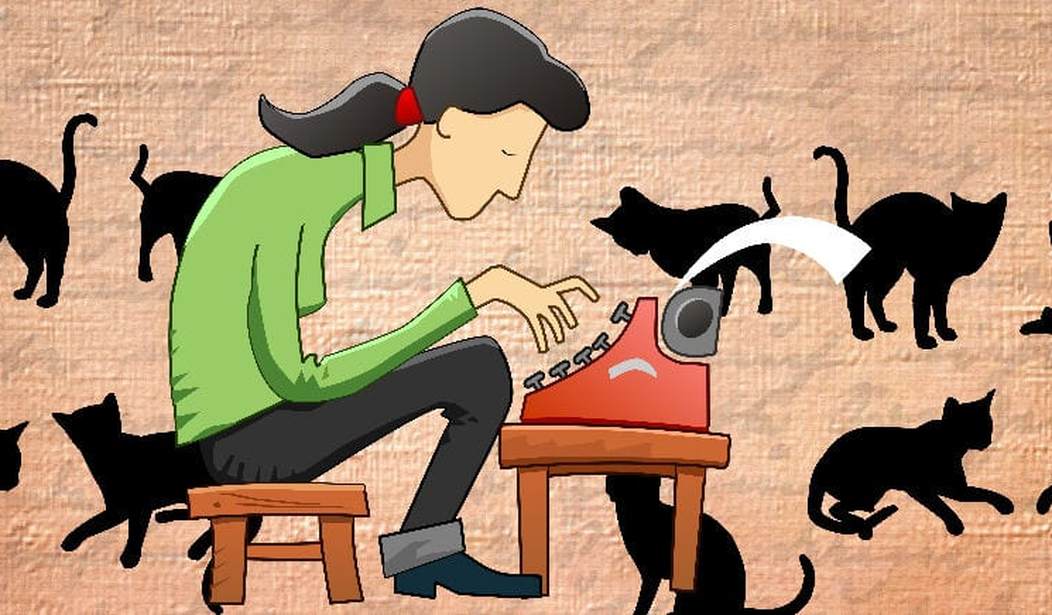Most of the time, when I meet people who are interested in writing (did you know that writers are asked almost as many questions at parties as doctors, even if markedly different?), they tell me “I’d like to be a writer, but—”
The but is never about the knowledge of the craft, but rather about other things that stand in the way of writing, so I decided to do a series about those obstacles, and how I get around them. Yes, “get” — because they never go away.
Lately, I’ve been having a problem. It’s not as bad as it could be, but it’s bad nonetheless. It’s beautiful out, the grass is green, birds are singing, and the LAST thing I want to do in the world is to work on things I need to work on.
To make things worse, I have to deal with those tasks that are part of writing but aren’t writing (which is the part I like) waiting for me: I have to correct/edit a hard SF short story and I need to edit a bunch of stories for an anthology I want to put together. I also have to go over copy-edits for my next short story collection. All of it is minutia work that isn’t as much fun as writing-writing.
To make things worse, I’ve been under the weather. (Apparently, when they say when you take the shingles vaccine you might have more of a reaction than with other vaccines, they ain’t just whistling Dixie. We’re talking fever, aches, and just generally feeling like someone hit me with a hammer for a good part of the week.)
Which is a problem. Because when writing is how you earn a living, you have to write. Even when you don’t feel like it. Even when you, to be fair, would rather saw off your hands with a blunt knife. Which isn’t where I am, but it’s where I’ve been in the past.
So, how do you stay with it?
To be fair I very often don’t. I both laughed and cried once when I read about Terry Pratchett, in a similar state of mind, deciding he had to clean his office, and research, and— whatever it was, it ended with him vacuuming his keyboard before he could force himself to work.
I’ve been there. Your brain can convince you the most bizarre tasks are essential. Like going to the office store for note paper of a specific color. Or finding out which of the hundreds of pens stuck at random in your drawer still work. Or—
I call this state rotating the cat: it’s useless, it’s unproductive, and it annoys the cat.
But here are two things:
My writing career (though it was 10 years before I sold a story) could be said to have started the night my husband told me writers write every day. He’s a musician, you see. (Not for a living. He’s a mathematician, but the two afflictions often go together.) Musicians practice every day. I told him I wasn’t even sure that I could write commercially in another language (this was the year I moved to the U.S.). And I might never have been good enough, and besides, well… besides, I really couldn’t force myself to write when I wasn’t inspired. He looked at me like I had two heads and told me, no, if I wanted to be a writer I had to write every day. Practice has a magic of its own. Just write it.
I did. As you see, eventually all the other things gave way as I defied the odds to have a traditional career. The odds of actually getting published at the time were less than one in a 100 per person who attempted it. They were probably worse for ESL speakers, but I never asked. (Yes, yes, I’ll get the indie going. Give me time, okay?) So, writers write. Every day.
The second thing I can tell you is that the muse or inspiration is a lie. Sure, sometimes it strikes and you write stuff in white-hot joy. That’s great. But you know what? You can do it when it doesn’t strike, too.
During the worst year of my career and close to the worst in my life — no one wanted to buy my stuff, we had a house we’d moved out of that wasn’t selling and were paying double mortgage, and then my husband lost his job — I wrote seventeen proposals (three chapters and outline, which honestly means most of the work on the novel is done), two novels for hire, and about 30 short stories.
Honestly, some days I couldn’t even think straight and had no clue if the words I strung together made sense. Inspiration? I’d have been glad with a mind. ANY mind. One of the cats lending me his IQ would have helped.
I was flying on toenail lint, which is to say practice, craft, the conscious knowledge I had of how to write, and, oh, yeah, those years on end of writing every day. Anything you practice long enough you can do, even under distress.
Well, I ended up selling most of the short stories not only to anthologies but also to an audio company (weirdly it’s not on audible); over the next five years I sold all of those proposals. Also, the novel for hire I wrote at that time, which took me so much effort I ended up forcing myself to write it in three days (after MONTHS of procrastination) is my highest grossing property, even though it’s under a pen name and all I get from it is like 2%. Worse/better, the ghost-written novel I wrote for another writer made her career and name.
Which goes to show you there’s a lot for “just write it.”
Now, I won’t say that half the time it’s not like chasing myself around and forcing my nose onto a grindstone. It is. But I do it because it’s what writers do.
If all else fails, get yourself a pomodoro timer and follow the method. This works if you’re a writer in a busy and loud house (hi guys) because then the crazy family members know they can get you in the “rest intervals.” My timer is the guilt cow who looks shocked I’m not concentrating fully on the writing.
There are other methods to make yourself write. There is the “turn off your net method,” the “give yourself a reward per x accomplished” method, and the weird “lock yourself in a featureless room and do nothing in there but write” method (I have a friend who does that and some famous author — Rex Stout — did the same.)
Find the method that works for you and write. Because the muse alone is not going to allow you to write enough to make a living. And besides, if you practice and work every day, you’ll have the skills to write even when the muse has run away with your brain and they’re both sipping daiquiris on the beach in Aruba.
You want to be a writer? Great. Writers write.
Look at it this way: What good does it do you to have the most beautiful novels in your head, if no one can ever read them?









Join the conversation as a VIP Member